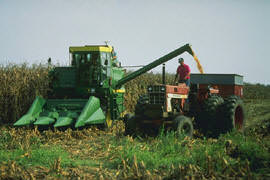
| Farms |
 The
production of cash crops in the southeastern New Mexico within
the Pecos Valley is made possible by subsurface extraction of a
rechargeable water source. Irrigated farms in the Pecos Valley
almost exclusively utilize underground water that is brought to
the surface by subsurface wells and typically applied to the
surface by flood irrigation, side roll sprinklers or pivot
sprinklers. The trend of irrigation application is towards
multiple tower automated pivot sprinklers that provide more
equitable distribution of water and is a more conservative
application. The
production of cash crops in the southeastern New Mexico within
the Pecos Valley is made possible by subsurface extraction of a
rechargeable water source. Irrigated farms in the Pecos Valley
almost exclusively utilize underground water that is brought to
the surface by subsurface wells and typically applied to the
surface by flood irrigation, side roll sprinklers or pivot
sprinklers. The trend of irrigation application is towards
multiple tower automated pivot sprinklers that provide more
equitable distribution of water and is a more conservative
application.New Mexico’s water law is derived from the mixture of Spanish and Mexican law, which is the rule of prior appropriation, “the first in time, the first in right”. This rule of prior appropriation applies to both surface water rights (rivers and streams) and underground rights (wells). Historically the Pecos Valley utilized surface river rights for irrigation purposes, however most of the river water rights have been purchased and retired. At the present time most all of the irrigation water is supplied by subsurface wells.  Irrigation water rights throughout New Mexico are administered
and regulated by the office of the New Mexico State Engineer.
The Roswell Underground Water Basin is a closed basin and
therefore there will be no new appropriations of water within
the Pecos Valley. The water rights within the Pecos Valley have
been adjudicated by court decree and are appurtenant to the
land. In other words an adjudicated water right will be applied
to specific acreage. Water rights may be transferred on a
temporary or permanent basis upon approval by the New Mexico
State Engineer. Adjudicated water rights are viewed to be a
property right and may be bought and sold similar to any other
parcel of property. Irrigation water rights throughout New Mexico are administered
and regulated by the office of the New Mexico State Engineer.
The Roswell Underground Water Basin is a closed basin and
therefore there will be no new appropriations of water within
the Pecos Valley. The water rights within the Pecos Valley have
been adjudicated by court decree and are appurtenant to the
land. In other words an adjudicated water right will be applied
to specific acreage. Water rights may be transferred on a
temporary or permanent basis upon approval by the New Mexico
State Engineer. Adjudicated water rights are viewed to be a
property right and may be bought and sold similar to any other
parcel of property.The climate of southeastern New Mexico allows for the production of most any class of cash crop to include alfalfa hay, corn, cotton, chile, and numerous types of vegetables. The growing season is approximately 180 days typically from the end of October through the middle of April.  A large commercial dairy industry has been trending upward for
the past twenty years. The production of milk has increased the
demand for irrigated crops that may be utilized as cattle feed
to include alfalfa hay and corn. This has been a benefit to the
irrigated farming throughout the valley. A large commercial dairy industry has been trending upward for
the past twenty years. The production of milk has increased the
demand for irrigated crops that may be utilized as cattle feed
to include alfalfa hay and corn. This has been a benefit to the
irrigated farming throughout the valley.We are currently sold out of our inventory of irrigated farms however please do not hesitate to contact Bar M Real Estate if you are interested in learning more about Pecos Valley irrigated farms. |